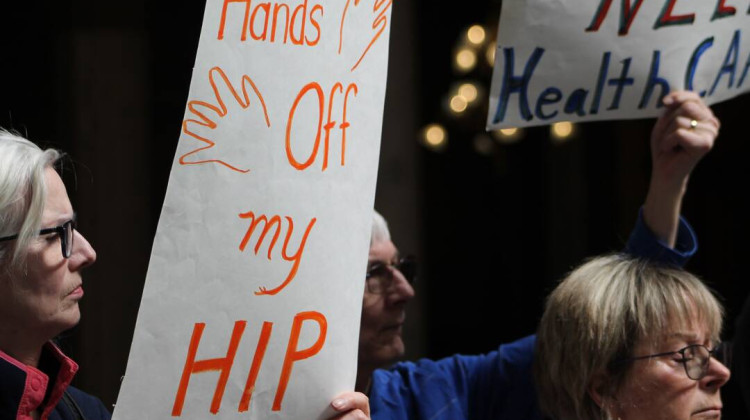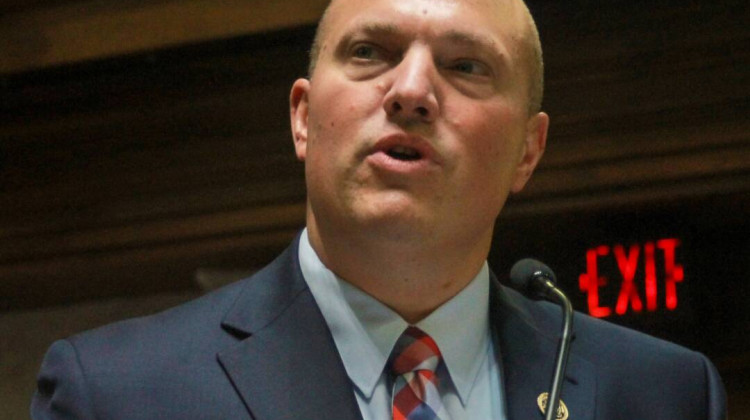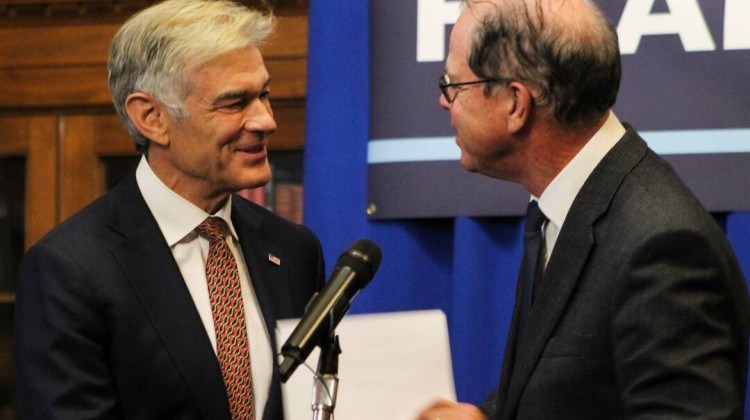
Indiana Gov. Eric Holcomb delivers his State of the State address to a joint session of the legislature at the Statehouse, Tuesday, Jan. 11, 2022, in Indianapolis.
AP Photo/Darron CummingsINDIANAPOLIS (AP) — Gov. Eric Holcomb extended Indiana's COVID-19 public health emergency for another month on Tuesday, though his intentions to end the declaration remained ensnarled in a legislative debate over whether the state should severely limit businesses from imposing workplace vaccination requirements.
The extension pushed the emergency declaration until March 4, which is just short of two years since it was declared at the start of the pandemic.
In extending it, Holcomb cited the state's high rate of infection and pointed out that the vast majority of people being hospitalized with COVID-19 aren't vaccinated. More than 21,000 people in Indiana have died of COVID-19, according to state health officials.
It is the 23rd monthlong extension that Holcomb has signed. The declaration and Holcomb’s COVID-19 executive orders stemming from it have been a persistent target of conservative criticism and pressure on him to end them.
Many health experts and medical groups have said ending the health emergency would send the wrong message with Indiana hospitals struggling to cope with high numbers of COVID-19 patients and the state averaging more than 50 deaths per day from the disease since mid-December.
Holcomb said in November that he would drop the emergency order if state legislators approved legal changes that would enable the state to keep receiving about $40 million a month in enhanced federal funding for Medicaid and for about 200,000 households to continue receiving an additional $95 a month in federal food assistance. Another step would let the state health commissioner continuing issuing a standing doctor’s order for the administration of COVID-19 vaccinations to children ages 5 to 11.
The Republican-dominated state Senate has approved a bill limited to those administrative actions, while House Republicans have pushed through a broader bill that would also limit workplace COVID-19 vaccination requirements. That bill would force employers to grant exemptions to workers who claim medical or religious objections as reasons they won't get vaccinated and limit employers to requiring COVID-19 tests no more than once a week.
Holcomb and major business organizations have argued against those limitations as wrongly interfering in the decisions of private businesses, while also opposing President Joe Biden’s attempt to require COVID-19 vaccinations or testing for workers at big companies.
Leading state Senate Republicans have so far stood against the business limitations, although more debate is likely before the legislative session ends in March.
“We’ll continue to have conversations to try and find the right landing spot between the right of people to dictate what their health is and whether or not the vaccine is right for them, plus the employer’s right to control what’s going on in their work environment,” Republican Senate President Pro Tem Rodric Bray said. “We’ll have some pretty robust conversations.”
State health department tracking shows that Indiana’s hospitals were treating about 2,800 COVID-19 patients as of Monday. That was about 20% fewer than two weeks ago but about seven times higher than last summer.
The state’s COVID-19 deaths average has declined to about 50 a day after topping 70 a day in mid-January.
 DONATE
DONATE






 Support WFYI. We can't do it without you.
Support WFYI. We can't do it without you.